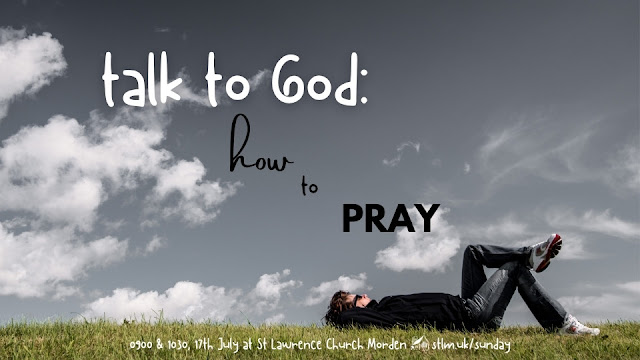Prayer as Relationship
We must be discerning about everything people teach, supposedly from the scripture. Scripture gives us parameters. Paul told the Corinthians, “… I decided to know nothing among you except Jesus Christ and him crucified” (1 Cor. 2:2). To the Galatians he wrote, “May I never boast of anything except the cross of our Lord Jesus Christ, by which the world has been crucified to me and I to the world” (Gal. 6:14). If the cross of Christ is absent from one’s teaching, then that one is not preaching and teaching the gospel.
That’s what’s problematic about the prosperity teaching. God does indeed want us to prosper, just not always in the way we think and certainly not always financially. We do not have to have the biggest, the best and the brightest to show how generous God is. If God never did another thing for us, it would be enough because of what God’s already done through his Son for us. Be wary of tv and radio preachers who drive fancy cars and use private jets to go everyplace and then have the nerve to ask for money for their ministry. God save us from such brashness and twisting of the gospel.
“Ask, and it will be given to you; For everyone who asks receives; search and you will find; and everyone who searches finds, knock, and the door will be opened for you. for everyone who knocks, the door will be opened.” This is what Jesus said and it certainly sounds like we should get whatever we want, like God’s a cosmic Santa Claus, doesn’t it? Most of the time our issue is that we don’t want to bother God with our problems, so we need to hear this. God desires to bless us and gives to us generously because that is God’s nature. The best way to be sure that what you are asking for is God’s will is to look at the earlier parts of this passage, to put it in context.
Let’s look at these verses’ connection to the Lord’s Prayer, which “does not require of us that we become anything we are not already. It is a deeply human kind of prayer. It is a prayer for human beings, that is, for creatures in need,” according to Bible commentator Cynthia Jarvis.
It all begins with relationship, “Father.” Before anything else is prayed, Jesus demonstrates the importance of being in relationship to the God to whom we are praying. The word “Father” is informal here, more like “Daddy.” The relationship is intimate, warm and loving.
“Hallowed” means holy. An update of the New Revised Standard Version says, “may your name be revered as holy.” We acknowledge the holiness of God and God’s name.
We pray for God’s kingdom to come. The kingdom is where the king is. It is the enacted will of God on earth. God’s kingdom is God’s reign and presence, which is here and now and in the future.
All of these things are prayed before we ever get to any petitions for ourselves, which is crucial. Teaching the disciples and us to pray, Jesus did not launch into a laundry list of what he wanted. Anything asked for was from and through his relationship with the Father—even his suffering and death as He prayed in the Garden, “not my will but yours be done” (Luke 22:42). Prayer is based on such a relationship that the disciples could ask, search and knock; being guaranteed that they were praying according to God’s will; thereby receiving God’s blessings.
The petitions are not a list of wants, but real needs. Theology professor, Douglas John Hall explains, “One is (1) dependent—ergo ‘Give us’; (2) guilty—ergo ‘Forgive us’; (3) lost and vulnerable—ergo ‘Lead us,’ ‘Deliver us.’”
The essence of prayer is connection. Baked into this passage, we see it in the Lord’s Prayer, the unsettling parable and finally God’s graciousness in giving to the children of the Heavenly Father. Through prayer we “participate in God’s commitment to bring forth God’s reign…” (Matthew L. Skinner).
We have a template in the Lord’s Prayer to assure that we are praying isn’t self-centered, but God-centered, including the needs of others, not simply ourselves. Jesus’ teaching on prayer begins with “Father” and the passage ends with “Father.” “If you, then, who are evil, know how to give good gifts to your children, how much more will the heavenly Father give the Holy Spirit to those who ask him!” (V. 13). That says it all. Jesus demonstrates prayer as a dynamic of relationship, so that God’s people live in the power of the Spirit.
A song by Chris Tomlin called “Good, Good Father,” nicely sums up God’s generosity.
Oh, I’ve heard a thousand stories
Of what they think You’re like
But I’ve heard the tender whisper
Of love in the dead of night
And You tell me that You’re pleased
And that I’m never alone
Refrain
You’re a good good Father
It’s who You are, it’s who You are, it’s who You are
And I’m loved by You
It’s who I am, it’s who I am, it’s who I am
Oh, and I’ve seen many searching
For answers far and wide
But I know we’re all searching
For answers only You provide
‘Cause You know just what we need
Before we say a word
Chris Tomlin
You’re a good, good Father. Amen.
Resources
Cynthia Jarvis, Douglas John Hall, Matthew L. Skinner, James A. Wallace, C.SS.R., Feasting On the Word: Year C, Volume 3
Rev. Paul Johansson
New Revised Standard Version Updated Edition
Sundaysandseasons.com



Comments